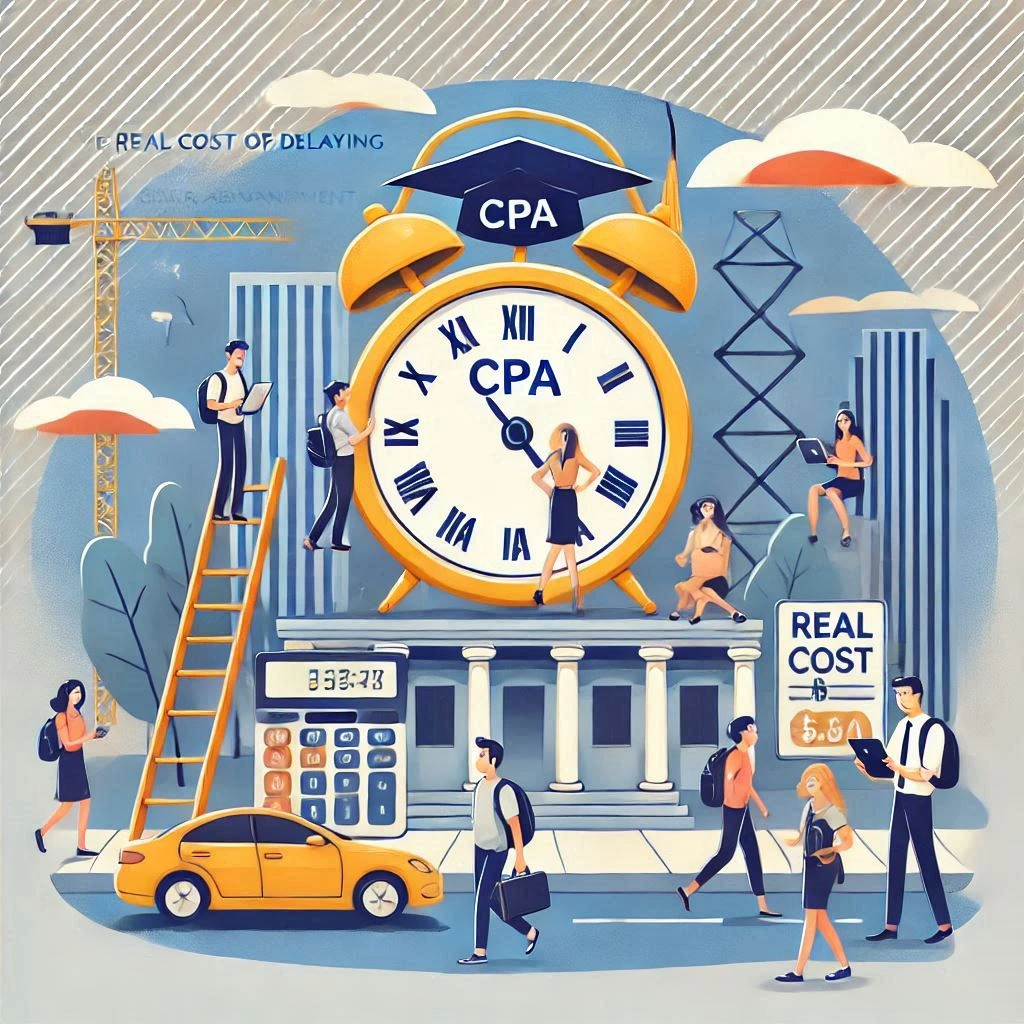Introduction
The journey to becoming a Certified Public Accountant (CPA) is a significant milestone for many professionals in the accounting and auditing fields, particularly for early-career internal auditors. The CPA certification not only validates an individual’s expertise in accounting principles and practices but also enhances their credibility and career prospects within the industry. As internal auditors navigate their careers, the relevance of CPA certification becomes increasingly apparent, serving as a critical differentiator in a competitive job market.
In recent years, the accounting profession has faced various challenges, including a notable barrier to entry due to the 150-hour CPA licensure requirement. This has led to a decline in the number of candidates pursuing the certification, particularly among younger professionals who may be deterred by the extensive time commitment and the perception of frequent scandals involving audit and assurance professionals [3][4]. Additionally, the profession is grappling with a marketing problem, where the lengthy educational requirements for CPA certification are often compared unfavorably to other professions, such as law, which requires a similar commitment of time but is perceived as more prestigious [6].
The implications of delaying CPA certification can be profound. Not only can it hinder career advancement opportunities, as many employers prioritize CPA certification for promotions, but it can also disrupt an individual’s professional development timeline. Missing application deadlines for the CPA exam can lead to significant delays in certification, pushing back career plans and potentially affecting job security [11].
In this blog section, we will explore the professional implications of postponing CPA certification for early-career internal auditors. By understanding the importance of timely certification, we aim to highlight how such delays can impact career trajectories, professional growth, and overall job satisfaction. Ultimately, the decision to pursue CPA certification should be viewed not just as a personal achievement, but as a strategic career move that can open doors to new opportunities and enhance one’s standing in the field of internal auditing.
Understanding the CPA Certification Process
Understanding the requirements and typical timelines involved in the CPA certification process is crucial for making informed decisions about your professional development.
Overview of CPA Certification Requirements
To obtain CPA certification, candidates must fulfill several key requirements:
- Educational Background: Candidates are required to complete 150 college credits, which typically includes earning a bachelor’s degree with relevant coursework in accounting and business [1][7]. This educational foundation is essential for understanding the complexities of accounting principles and practices.
- Work Experience: In addition to educational qualifications, candidates must gain 1-2 years of relevant work experience. This practical experience is often obtained through internships or entry-level positions in accounting or auditing [1][13].
- Examinations: The CPA exam consists of four sections: Auditing and Attestation, Business Environment and Concepts, Financial Accounting and Reporting, and Regulation. Candidates must pass all four sections within an 18-month rolling window, which begins once they pass their first section [3][9].
Typical Timeline for Completing the CPA Process
The timeline for achieving CPA certification can vary significantly based on individual circumstances, but here is a general breakdown:
- Educational Preparation: Completing the necessary educational requirements can take approximately 4-5 years, depending on the candidate’s prior credits and the pace of their studies [12][15].
- Exam Preparation: After meeting educational requirements, candidates typically spend 6 to 12 months preparing for the CPA exams. This preparation often involves enrolling in review courses, studying diligently, and scheduling the exams strategically [14].
- Licensure: Once the exams are passed and the work experience is completed, candidates must apply for licensure, which may involve additional state-specific requirements [10]. The entire process from education to licensure can take an average of 5-7 years, depending on how quickly candidates progress through each stage [12][15].
Factors Influencing the Time Taken to Achieve CPA Certification
Several factors can influence the duration of the CPA certification process:
- Educational Path: The time taken to complete the required 150 college credits can vary based on whether candidates attend school full-time or part-time, and how many credits they transfer from previous studies [12].
- Exam Readiness: The amount of time candidates dedicate to studying for the CPA exams can significantly impact their timeline. Some may pass all sections on the first attempt, while others may require multiple attempts, extending the overall process [14].
- Work Experience Opportunities: The availability of relevant work experience can also affect the timeline. Candidates who secure internships or entry-level positions in accounting early in their education may complete this requirement more quickly [13].
The Immediate Impact of Delaying CPA Certification
Delaying CPA certification can have significant short-term consequences for early-career internal auditors. Here are some key points to consider:
- Potential Loss of Job Opportunities and Promotions: Many CPA firms and organizations require candidates to have completed their CPA certification to be considered for certain positions or promotions. As noted, most CPA firms expect candidates to have completed 150 hours of education before hiring, which can limit opportunities for those who delay their certification process [1]. Furthermore, some firms have begun to relax the requirement for a CPA license for managerial positions, but this trend is not universal, and many still view the CPA as a critical qualification for advancement [4].
- Impact on Salary and Benefits: The financial implications of postponing CPA certification can be substantial. Certified Public Accountants typically command higher salaries compared to their non-certified counterparts. The findings suggest that a reduction in the number of credit hours required to sit for the CPA exam has led to an increase in candidates, indicating that those who pursue certification can enhance their earning potential significantly [6]. Without the CPA designation, early-career auditors may find themselves at a disadvantage in salary negotiations and may miss out on benefits that are often tied to certification status.
- Effect on Professional Credibility and Confidence: Holding a CPA license can enhance an auditor’s professional credibility. The perception that only accountants make good internal auditors has persisted for over a century, and obtaining a CPA can help dispel this myth, reinforcing the auditor’s qualifications and expertise [2]. Additionally, the confidence that comes from being certified can empower auditors to take on more challenging projects and responsibilities, fostering professional growth. Conversely, delaying certification may lead to self-doubt and a lack of confidence in one’s abilities, which can hinder career progression [8].
Long-Term Career Implications of Not Pursuing CPA
For early-career internal auditors, the decision to pursue a Certified Public Accountant (CPA) designation can significantly influence their professional trajectory. The CPA credential is not merely a certification; it serves as a critical asset that can open doors to advanced career opportunities and enhance professional credibility. Here are some key points to consider regarding the long-term implications of delaying CPA certification:
- Importance of CPA for Career Progression: The CPA designation is highly regarded in the accounting and internal audit fields. Many organizations, including government entities, require internal auditors to hold a CPA license. This credential not only demonstrates a high level of expertise but also signals a commitment to the profession, which can be crucial for career advancement. Without it, early-career auditors may find themselves at a disadvantage when competing for promotions or more complex assignments [6][12].
- Comparison of Career Trajectories: CPAs often experience faster career progression compared to their non-CPA counterparts. Research indicates that individuals with CPA credentials tend to have more opportunities for leadership roles and higher earning potential. For instance, the lack of CPA credentials can lead to missed or delayed promotion opportunities, as many organizations prioritize candidates with this certification for key positions [14][15]. This disparity can create a significant gap in career advancement, making it essential for early-career auditors to weigh the benefits of obtaining their CPA against the potential stagnation in their careers.
- Potential for Stagnation in Roles and Responsibilities: Without the CPA designation, internal auditors may find themselves limited to entry-level positions or basic responsibilities. The CPA credential is often a prerequisite for more advanced roles that involve strategic decision-making, risk management, and compliance oversight. As the profession evolves, the demand for CPAs continues to grow, and those without the certification may struggle to keep pace with industry changes and expectations [11][15]. This stagnation can lead to frustration and a lack of fulfillment in one’s career, as opportunities for professional growth become increasingly scarce.
Job Market Trends and the Value of CPA Certification
In the evolving landscape of the accounting profession, obtaining a Certified Public Accountant (CPA) certification has become increasingly vital, especially for early-career internal auditors. The current job market trends reveal a strong preference for CPA holders, which can significantly impact career advancement opportunities. Here are some key points to consider:
- High Demand for CPAs: The demand for CPAs remains robust as firms adapt to changing client needs and technological advancements. This trend is particularly evident in specialized areas such as Environmental, Social, and Governance (ESG) reporting, technology adoption, and cybersecurity, where CPA certification is often a prerequisite for employment [4].
- Employer Preferences: Employers in the internal audit sector are increasingly favoring candidates with CPA certification. This preference stems from the perception that CPAs possess a deeper understanding of accounting principles, tax laws, and regulatory requirements, which are crucial for effective auditing. As a result, early-career internal auditors who delay obtaining their CPA may find themselves at a disadvantage in a competitive job market [5][10].
- Long-Term Industry Forecasts: Projections indicate that the demand for accountants and internal auditors is set to increase by approximately 4% from 2022 to 2032, aligning with the overall growth of the profession [11]. However, the Bureau of Labor Statistics anticipates that around 135,000 new accounting and auditing jobs will be created annually from 2021 to 2031, many of which will require CPA certification [3]. This trend underscores the growing importance of the CPA credential in securing desirable positions within the industry.
- Impact of Delaying Certification: Postponing CPA certification can have significant professional implications for early-career internal auditors. As the workforce ages, with a substantial portion of current CPAs nearing retirement, there is an urgent need for younger professionals to fill the gap. Those who delay their certification may miss out on valuable opportunities as firms seek to hire qualified candidates who can meet the demands of the evolving job market [3][6].
Personal Development and Professional Growth
Delaying CPA certification can have significant implications for early-career internal auditors, particularly in terms of personal development and professional growth. Here are some key points to consider:
- Skills Acquired Through the CPA Process: The CPA certification process equips auditors with a comprehensive understanding of accounting principles, auditing standards, and regulatory requirements. This knowledge is crucial for internal auditors, as it enhances their ability to assess risks, evaluate internal controls, and provide valuable insights to their organizations. Additionally, the CPA curriculum emphasizes the development of both technical and soft skills, such as critical thinking, problem-solving, and effective communication, which are essential for success in the auditing profession [11].
- Networking Opportunities and Professional Associations: Becoming a CPA opens doors to numerous networking opportunities. CPAs often join professional associations, such as the American Institute of CPAs (AICPA) or local CPA societies, which provide platforms for connecting with other professionals in the field. These associations offer access to industry events, seminars, and workshops, allowing auditors to build relationships, share knowledge, and stay updated on industry trends. Networking can lead to mentorship opportunities and job referrals, which are invaluable for career advancement [12].
- Role of Continuous Education and CPA Maintenance: The accounting profession is dynamic, with regulations and standards constantly evolving. CPAs are required to engage in continuing professional education (CPE) to maintain their certification. This commitment to lifelong learning not only ensures that auditors remain knowledgeable about the latest developments in the field but also demonstrates their dedication to professional growth. Engaging in CPE can enhance an auditor’s credibility and marketability, ultimately contributing to career longevity and advancement [9][15].
Conclusion
In the competitive field of internal auditing, the decision to delay obtaining your CPA certification can have significant professional implications. Here are the key points to consider:
- Risks of Delaying CPA Certification: Postponing your CPA can hinder your career progression. Without this credential, you may miss out on opportunities for promotions, salary increases, and specialized roles that require CPA licensure. The longer you wait, the more you risk falling behind your peers who are advancing their careers with this essential qualification. Additionally, the CPA exam requires a considerable investment of time and effort, and delaying it can lead to a loss of momentum in your professional development [12][15].
- Importance of Acting Decisively: Taking timely action towards obtaining your CPA is crucial for your career advancement. The certification not only enhances your credibility and expertise but also opens doors to leadership positions within your organization. Early-career internal auditors should recognize that the sooner they achieve this milestone, the better positioned they will be to seize opportunities and make impactful contributions to their teams [10][15].
- Encouragement for Action: As you reflect on your career goals, consider the actionable steps you can take towards obtaining your CPA certification. This may include creating a study schedule, enrolling in preparatory courses, or seeking mentorship from experienced CPAs. By prioritizing your CPA journey, you are investing in your future and setting yourself up for success in the dynamic field of internal auditing [14][15].
In summary, the real cost of delaying your CPA certification extends beyond time; it can significantly impact your career trajectory. Embrace the challenge, act decisively, and take the necessary steps to achieve your CPA certification. Your future self will thank you for it.
Find out more about Shaun Stoltz https://www.shaunstoltz.com/about/
This post was written by an AI and reviewed/edited by a human.



